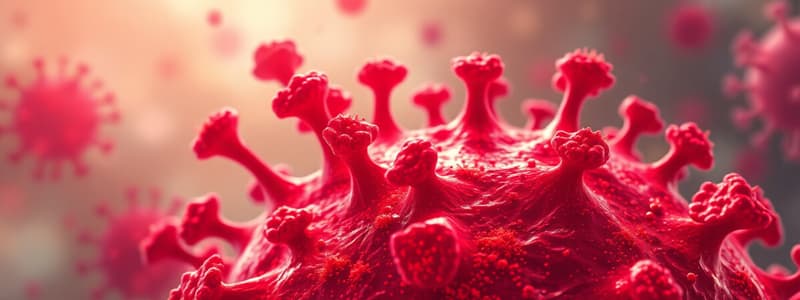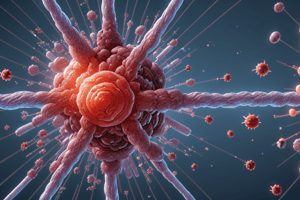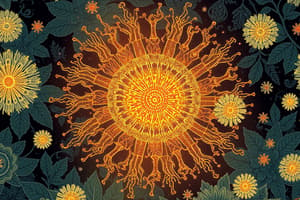Podcast
Questions and Answers
Neutrophils
Neutrophils
- produce antibodies.
- are elevated during an allergic response.
- produce histamine.
- are phagocytic cells. (correct)
Which cells are required to process and present antigens from foreign material as the initial step in the immune response?
Which cells are required to process and present antigens from foreign material as the initial step in the immune response?
- Eosinophils
- Macrophages (correct)
- T-helper cells
- Monocytes
Humoral immunity is mediated by
Humoral immunity is mediated by
- B lymphocytes (B cells). (correct)
- neutrophils.
- natural killer cells.
- T lymphocytes (T cells).
A secondary immune response differs from the primary immune response in that
A secondary immune response differs from the primary immune response in that
Which type of immunity is provided by a vaccination?
Which type of immunity is provided by a vaccination?
When an allergen binds with IgE antibodies on mast cells, resulting in release of chemical mediators, this reaction is called
When an allergen binds with IgE antibodies on mast cells, resulting in release of chemical mediators, this reaction is called
The role of memory cells is to
The role of memory cells is to
Which statement applies to contact dermatitis?
Which statement applies to contact dermatitis?
Which of the following causes anaphylaxis?
Which of the following causes anaphylaxis?
Following a positive HIV antibodies blood test and ELISA test, what is the test commonly used for confirmation?
Following a positive HIV antibodies blood test and ELISA test, what is the test commonly used for confirmation?
Incompatible blood transfusions result in
Incompatible blood transfusions result in
An autoimmune disease is
An autoimmune disease is
Systemic lupus erythematosus is caused by
Systemic lupus erythematosus is caused by
Distinguishing clinical features of systemic lupus erythematosus include
Distinguishing clinical features of systemic lupus erythematosus include
Which of the following are the target cells for HIV?
Which of the following are the target cells for HIV?
A diagnosis of HIV positive means that
A diagnosis of HIV positive means that
HIV infection impairs
HIV infection impairs
Immunodeficiencies may result in an increased risk of infections by normally harmless microorganisms. These infections are referred to as
Immunodeficiencies may result in an increased risk of infections by normally harmless microorganisms. These infections are referred to as
Serious infections frequently occurring in patients with AIDS include
Serious infections frequently occurring in patients with AIDS include
Which of the following statements does NOT apply to major histocompatibility complex (MHC) proteins or molecules?
Which of the following statements does NOT apply to major histocompatibility complex (MHC) proteins or molecules?
CD4-positive helper T cells function by
CD4-positive helper T cells function by
Host-versus-graft disease refers to
Host-versus-graft disease refers to
Which of the following complications does NOT occur frequently in AIDS patients?
Which of the following complications does NOT occur frequently in AIDS patients?
Which of the following characteristics apply to HIV?
Which of the following characteristics apply to HIV?
In cases of HIV infection, the "window period" refers to the time between
In cases of HIV infection, the "window period" refers to the time between
Which cells process and present antigens from foreign material as the initial step in the immune response?
Which cells process and present antigens from foreign material as the initial step in the immune response?
Which of the following is mediated by B lymphocytes (B cells)?
Which of the following is mediated by B lymphocytes (B cells)?
Flashcards
Neutrophils
Neutrophils
Phagocytic cells that ingest pathogens.
Antigen processing cells
Antigen processing cells
Cells that present foreign antigens to initiate immune response.
Humoral immunity
Humoral immunity
Immune response mediated by B lymphocytes.
Secondary immune response
Secondary immune response
Signup and view all the flashcards
Vaccination immunity type
Vaccination immunity type
Signup and view all the flashcards
Type I hypersensitivity
Type I hypersensitivity
Signup and view all the flashcards
Memory cells
Memory cells
Signup and view all the flashcards
Contact dermatitis
Contact dermatitis
Signup and view all the flashcards
Anaphylaxis
Anaphylaxis
Signup and view all the flashcards
Western blot test
Western blot test
Signup and view all the flashcards
Incompatible transfusions
Incompatible transfusions
Signup and view all the flashcards
Autoimmune disease
Autoimmune disease
Signup and view all the flashcards
Systemic lupus erythematosus
Systemic lupus erythematosus
Signup and view all the flashcards
HIV target cells
HIV target cells
Signup and view all the flashcards
HIV positive diagnosis
HIV positive diagnosis
Signup and view all the flashcards
Cytokine effect
Cytokine effect
Signup and view all the flashcards
Seroconversion
Seroconversion
Signup and view all the flashcards
Immunodeficiency infections
Immunodeficiency infections
Signup and view all the flashcards
Tolerance in immunity
Tolerance in immunity
Signup and view all the flashcards
Complement system
Complement system
Signup and view all the flashcards
Immunoglobulin production
Immunoglobulin production
Signup and view all the flashcards
Thymus role
Thymus role
Signup and view all the flashcards
Antibody in mucous membranes
Antibody in mucous membranes
Signup and view all the flashcards
IgGs in pregnancy
IgGs in pregnancy
Signup and view all the flashcards
Major histocompatibility complex (MHC)
Major histocompatibility complex (MHC)
Signup and view all the flashcards
Host-versus-graft disease
Host-versus-graft disease
Signup and view all the flashcards
Cytokine storm condition
Cytokine storm condition
Signup and view all the flashcards
Infants & HIV
Infants & HIV
Signup and view all the flashcards
Common AIDS complications
Common AIDS complications
Signup and view all the flashcards
B lymphocyte maturation site
B lymphocyte maturation site
Signup and view all the flashcards
HIV highest incidence
HIV highest incidence
Signup and view all the flashcards
Study Notes
Chapter 07: Immunity
- Neutrophils are phagocytic cells.
- Macrophages process and present antigens during the initial immune response.
- B lymphocytes (B cells) mediate humoral immunity.
- Secondary immune responses are faster and produce higher antibody levels than primary responses.
- Active artificial immunity is acquired through vaccination.
- Type I hypersensitivity occurs when an allergen binds to IgE antibodies on mast cells, releasing chemical mediators.
- Systemic lupus erythematosus (SLE) is characterized by immune complex deposits of antinuclear antibodies.
- HIV targets helper T lymphocytes (CD4 lymphocytes).
- HIV infection impairs both humoral and cell-mediated immunity.
- Opportunistic infections are common in AIDS patients.
- Seroconversion is when antibodies for HIV are detected in the blood.
- Cytokines activate and stimulate B and T lymphocytes.
- Tolerance is the immune system's ability to ignore "self" cells.
- Immunoglobulins (antibodies) have a unique amino acid sequence.
- IgA is found in mucous membranes.
- IgG is transferred from mother to the fetus across the placenta.
- B lymphocytes mature in bone marrow.
Studying That Suits You
Use AI to generate personalized quizzes and flashcards to suit your learning preferences.




